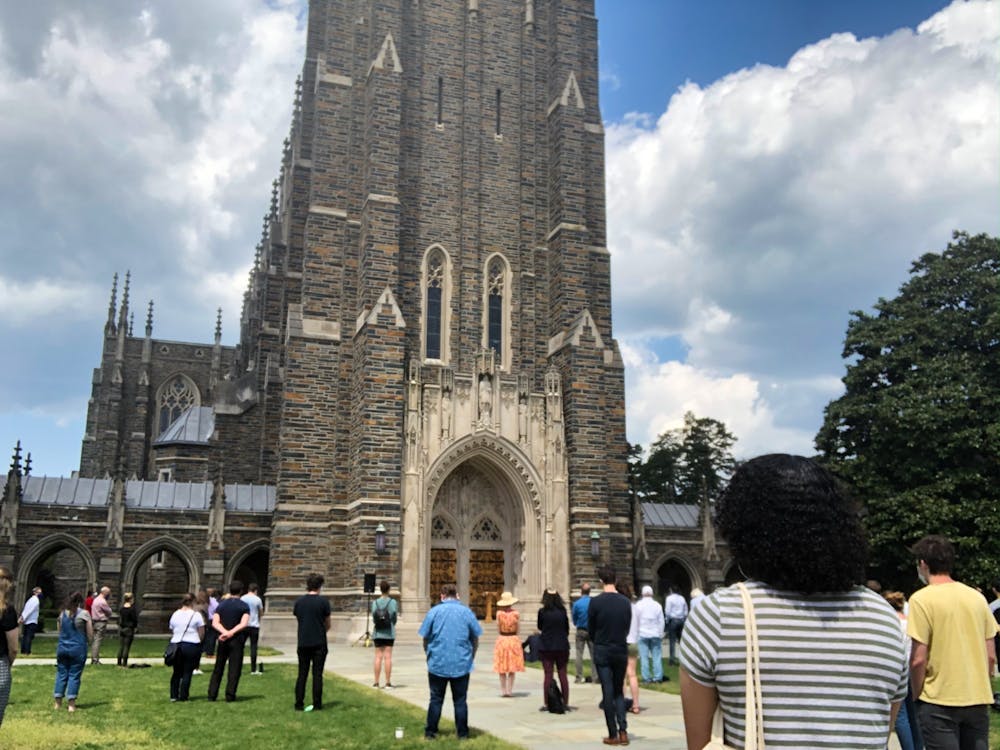Quinton Smith, interim director of the Mary Lou Williams Center for Black Culture, stood on the steps of the Duke Chapel Wednesday afternoon. He spoke about Derek Chauvin’s Tuesday conviction for the murder of George Floyd, evoking hope tempered with knowledge of the challenges that remain.
“For many, the guilty verdict in this case symbolizes not only the achievement of justice for George Floyd and his family, but evidence that perhaps our long fight for liberation is not in vain,” Smith said.
Yet the verdict will not help close the racial wealth gap in America, he noted. It will not advance equity in schools, address housing discrimination, normalize Black hair, reduce the harm the health-care system does to Black women, fix the criminal justice system.
“Sing if you have breath. Dance if you have mobility. Revel in the victories that we have been able to experience,” Smith said. “But do so knowing that this is one verdict, against one man, for one injustice. The guilt of Derek Chauvin does not signify the end of racism in general, or anti-Blackness in particular.”
Administrators and the chair of the African and African American studies department reflected on the outcome of Chauvin’s trial in the Wednesday event. Students and other community members gathered on the quad in front of the Chapel to watch.
The audience stood in silence, listening to Black leaders at Duke speak. In their moment of reflection, they joined Americans who came out into the streets, from George Floyd Square in Minneapolis to Times Square in New York, to celebrate the verdict or process a step toward accountability for police killings of Black Americans.
Dean of Students John Blackshear recalled waiting for the verdict to come in. He referenced the the song “Strange Fruit,” about lynchings of Black Americans during the Jim Crow era.
“I thought about the strange fruit that caused an uprising in this country … I thought about the strange fruit, and this act of seeking accountability that was taking place right before us, when the life that had infinite possibility was squeezed from the neck of George Floyd,” he said.
He held his breath while he waited for the verdict, expecting “the inevitable, the highly probable,” hoping for “the unlikely.” When the guilty verdict came in, Blackshear exhaled.
It was an acknowledgement that Black people were not strange fruit, he said Wednesday, but “people intentionally brought to this space, in this place and time, by something great and divine. And that only happens because we demand it.”
“We are not strange fruit,” he said again.
Mark Anthony Neal, James B. Duke Distinguished Professor of African and African American studies and chair of the African and African American studies department, noted that citizens have captured on video “hundreds” of instances of violence against Black people. But in many cases, officers are acquitted despite video of what happened.
Chauvin’s conviction was an anomaly, he said.
“When I heard the verdict yesterday, my first reaction was no reaction,” he said, “because just as we’ve seen so many videos in the last decade or so, we’ve seen so many acquittals and non-indictments in that period of time.”
Neal said that he doesn’t find solace in the verdict.
“We still have to address the conditions that bring us to the moment of George Floyd in the first place,” he said. “Why is it that Black and brown people in this country face the possibility of death for inconsequential, seemingly, interactions with police officers?”
Valerie Ashby, dean of Trinity College of Arts and Sciences, reflected on finding strength in the face of injustice, discrimination and hate.
“I just say to all of those students, particularly, who are out there, our people come from the Middle Passage,” she said. “And I am never too tired or too weary to wake up every day and fight this fight for you.”
After Ashby spoke, the Chapel bells began to ring. They rang for nine minutes and 29 seconds. A wind stirred the magnolia trees as the crowd stood in silence.
The bells stopped ringing. Gary Bennett, vice provost for undergraduate education, who also spoke at the beginning of the event, stepped up to speak.
“I hope we can use this moment as an opportunity to connect with one another,” he said. “And as so many of my colleagues have said, recommit ourselves to the fight for justice and the act of supporting one another.”
Correction: This article has been updated to reflect that the bells rang for nine minutes and 29 seconds. It originally stated that they rang for eight minutes and 46 seconds. The Chronicle regrets the error.
Get The Chronicle straight to your inbox
Signup for our weekly newsletter. Cancel at any time.
Matthew Griffin was editor-in-chief of The Chronicle's 116th volume.

